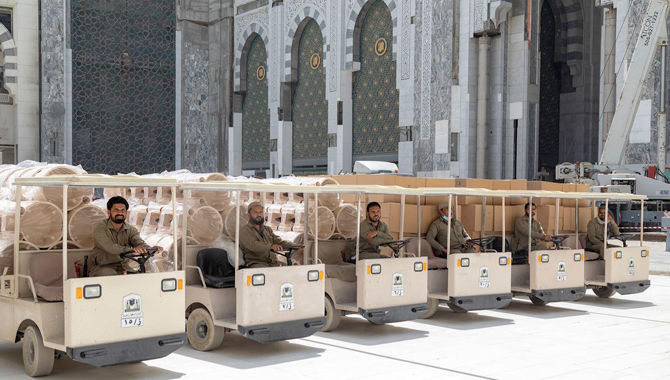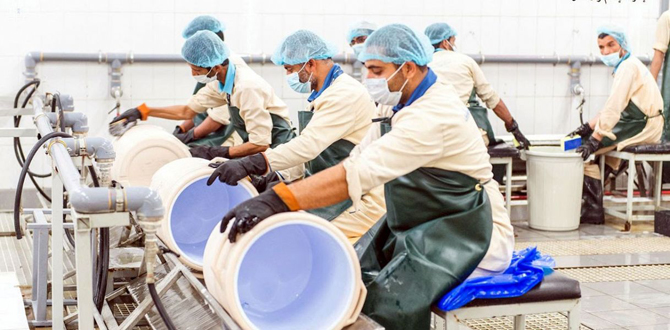DUBAI: As pilgrims arrive in Saudi Arabia to perform Hajj, accommodation, transportation and the safety of more than 2 million people are some of the biggest issues the Kingdom’s authorities have to deal with. But there is another daunting challenge that does not attract the same amount of media attention: The water requirements of such a massive transient population.
Last year, the total number of foreign and local pilgrims who performed Hajj touched the 2.4 million mark. To cope with the ever-increasing demand for potable water in Makkah and other holy sites, particularly during Hajj and Umrah, Saudi authorities recently launched six major projects with an estimated total cost of SR3.1 billion.
Referring to the expansion plans, undertaken by the Saline Water Conversion Corporation, the National Water Company (NWC) and the Saudi Water Partnership Company, Abdulrahman bin Abdulmohsen Al-Fadley, Saudi Minister for Environment, Water and Agriculture, said that they demonstrated the attention being paid to the water sector and services in Makkah and the holy sites.
The new projects will include a desalinated-water pipeline from the Shuaiba Water Desalination Plant and the second phase of the Shuaiba Water Desalination Plant project.

Water reservoir under construction in Makkah. (SPA file photo)
Al-Fadley said that his ministry has ensured that “all projects and water plans are based on the objectives of the National Water Strategy and the Comprehensive Water Plan in the Kingdom in order to reach a sustainable water sector that conserves water resources, preserves the environment, offers quality services and contributes to economic and social development.”
The number of pilgrims who will visit Makkah and other holy sites for Hajj and Umrah is projected to reach 15 million by 2020 — and 30 million by 2030. The planned desalination plants and pipelines are expected to go a long way toward meeting the anticipated rise in water demand.
“These projects have strategic importance for Saudi Arabia as it is a matter of national pride for the Kingdom to have Makkah and the holy sites within its territory,” Dr. Peng Wang, professor of environmental science and engineering at the King Abdullah University of Science and Technology (KAUST), told Arab News.
“Serving these places and their visitors with adequate amounts of water is understandably a priority.”
IN NUMBERS
- 6 major water projects launched for Makkah and other holy sites.
- 400,000 cubic meters of additional water to become available for seasonal consumption.
- 41 million cubic meters of water expected to be distributed during Hajj season.
- 184 million cubic meters of additional water consumed in Makkah between 2011-2018.
- 15 million more pilgrims for Umrah and Hajj expected between 2020-2030.
The numbers are, to put it mildly, daunting. Water consumption in Makkah rose from 600 million cubic meters in 2011 to 784 million cubic meters in 2018. According to the NWS, in 2015 alone, the total volume of water distributed during the Hajj season exceeded 10 million cubic meters, with a daily consumption of 770,000 cubic meters in Makkah and the holy sites.
“Saudi Arabia has limited national resources, such as groundwater and water from the Zamzam well in Makkah,” said Dr. Khalil Ammar, principal scientist in hydrogeology and water resources management at the International Center for Biosaline Agriculture in Dubai.
“The quantities are not enough to satisfy the huge number (of visitors) who come to Saudi Arabia during the Hajj season and for Umrah the rest of the year. There is also a high demand for freshwater resources for drinking purposes.”
One way to meet this challenge, Dr. Ammar said, is to desalinate water since the cost of the process is falling. Saudi water authorities “need to sustain the resources there, which means that desalination could help them meet the peak demands during this period,” he told Arab News.

Water containers are accessible in every corner of the holy sites in Makkah. (SPA file photo)
“It’s a viable source for them as other sources cannot cover these peak demands. So it’s the best option.”
The NWC has said that it expects to pump and distribute about 41 million cubic meters of water during the Hajj season.
NWC facilities will pump about 400,000 cubic meters of additional water for seasonal consumption, taking into account the need for pilgrims to perform Hajj rituals.
“Because the demand is not only for drinking water, it includes all the hotel uses, cooking as well as ablution, water should be provided in Makkah and other holy sites at the right time for such uses,” Dr. Ammar said.

“The quantities that are supplied on time are very important to keep the activities going on in these religious sites. As there is a higher consumption and use of water, we also expect there will be correspondingly higher wastewater discharge.”
Wastewater discharge could be optimized in the way it is collected, treated and reused, and perceived as a valuable resource as part of the Kingdom’s water budget. “Wastewater can be utilized for landscaping and urban agricultural production,” Dr. Ammar said.
“The more the Saudi authorities invest in studying how they can achieve a closed cycle and the more efficiently they use the water, with the right awareness on how not to overuse it, the better will be the outcome in their national policies, targets and objectives and compliance with the sustainability they are targeting.”
In this regard, the Kingdom is on the right track, said Dr. Najib Dandachi, CEO of UAE-based consultancy Al-Usul. The new Saudi desalination projects constitute a major advance toward the next phase of water sustainability, he said. “They will deliver greater water resource using improved technology at reduced costs and replace aging assets that ought to be retired,” Dr. Dandachi told Arab News.

Workers move to distribute water tanks at the Grand Mosque in Makkah. (SPA file photo)
“Additionally, these projects will satisfy the growing demand in the Kingdom, especially those needed for newly introduced strategic initiatives and developments that the Vision 2030 has embarked on.”
Although tariff systems to control water consumption have been introduced in different parts of the Gulf, water conservation has long been a challenge for the region. “Having more innovative methods of using designs and water-saving technologies can help,” Dr. Ammar said. “But it’s not always in place. So, it is crucial to further study the value of water and then inform people about the costs and how vital it is to conserve the commodity.”
Experts say the water sector in Saudi Arabia is undergoing massive changes that are critically needed to achieve greater security, sustainability and improved efficiency. “This does not just concern the production side,” Dr. Dandachi said.
“The sector could also do with comprehensive restructuring and change in its management approach that will introduce best practice in terms of governance, asset management, better regulation and business focus to optimize cost.”
To expedite much-needed improvements, Dr. Dandachi suggests a number of measures: Continuous rather than time-based supply; reliable billing; proactive customer engagement; quality and security; and the introduction of the private sector through some sort of outsourcing.

Workers cleaning water containers at the Grand Mosque in Makkah. (SPA file photo)
“The water sector in Saudi Arabia requires complete reform, restructuring, repositioning because it has been lagging behind in comparison to the rest of the region,” he said.
In the same vein, Dr. Peng of KAUST noted that Saudi Arabia not only has the largest seawater desalination capacity in the world, its average per capita water consumption (266 liters per day in 2017) is also very high.
“In a place with extreme freshwater scarcity like Saudi Arabia, water conservation, more efficient use of water and wastewater reclamation and reuse are strategies for long-term water sustainability,” he told Arab News.
“How to deliver safe and reliable freshwater to sustain a fast-growing population is a challenge to the country as well as to the rest of the world. For the Kingdom, water security is national security.”

















